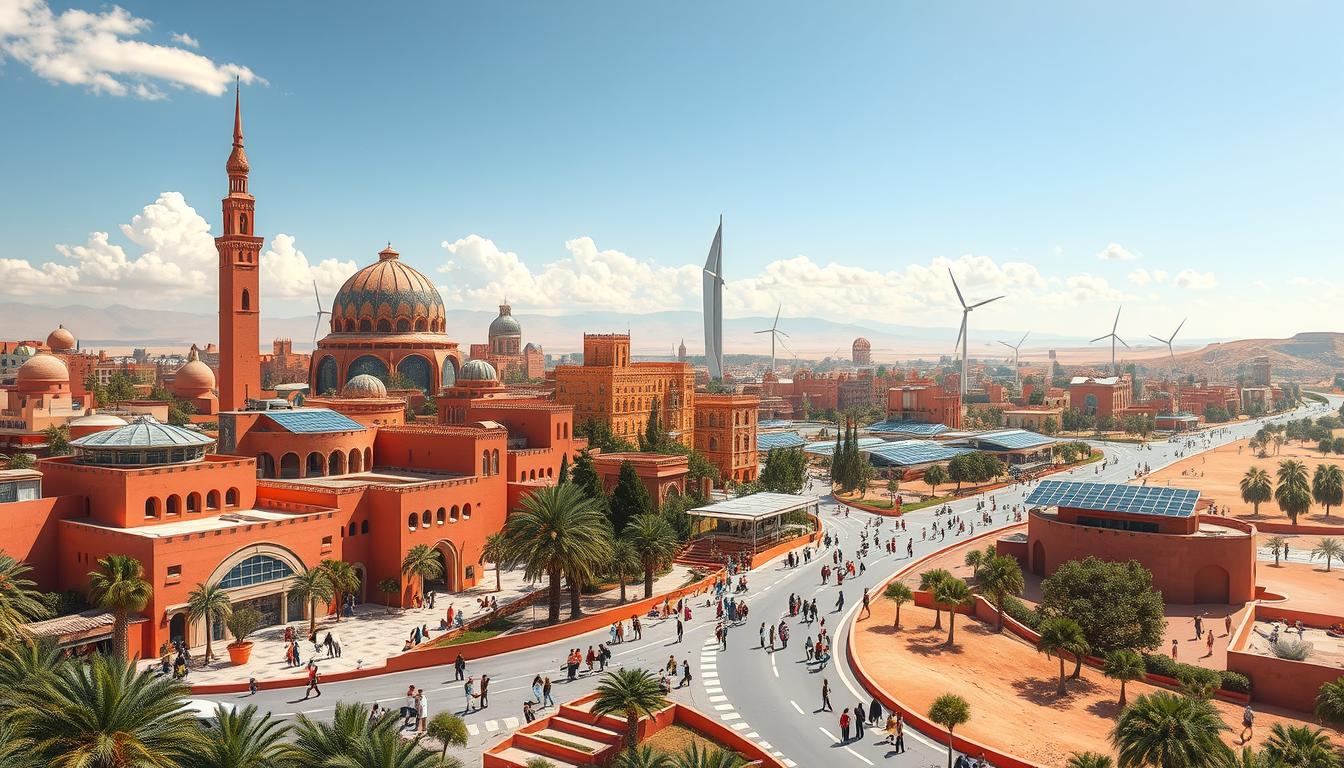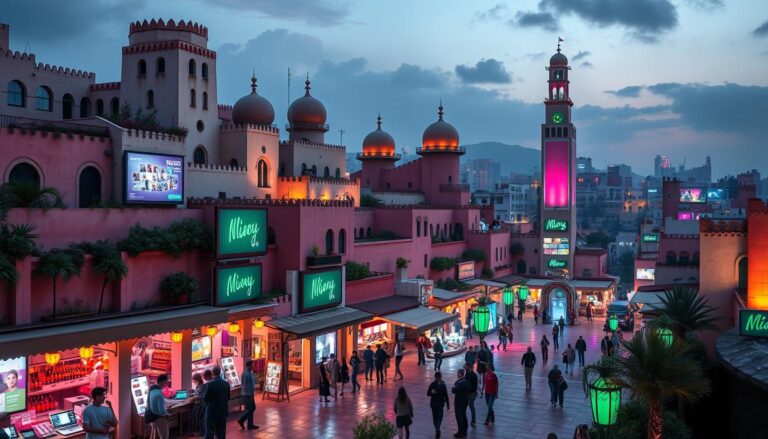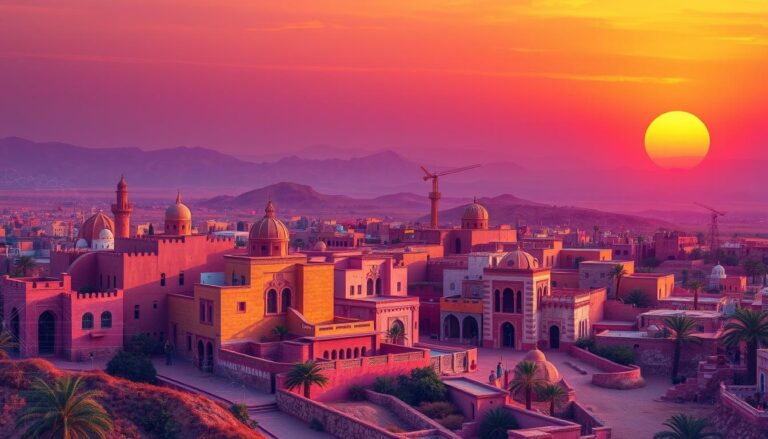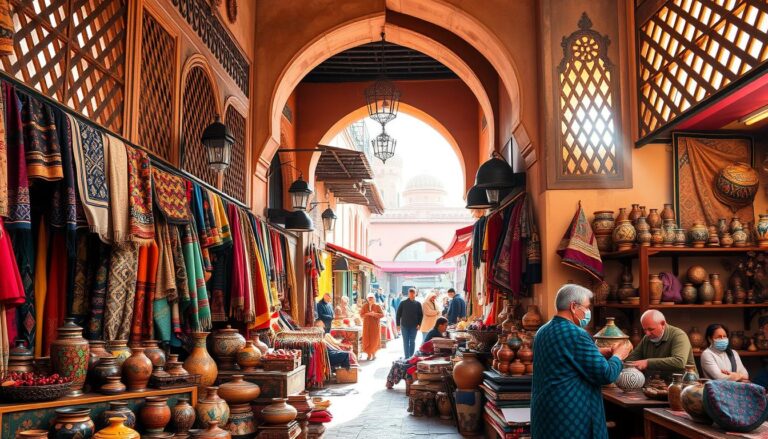Imagine if a nation’s digital strength could make all the difference in times of crisis. Morocco is showing the world what it means to be a leader in technology. Even when global IT outages happen, Morocco stays strong.
Recently, Morocco’s national carrier, Royal Air Maroc (RAM), faced a brief outage. But thanks to Morocco’s solid digital setup, RAM was back in action quickly. This shows how Morocco is ready for any digital challenge.
RAM’s fast recovery shows Morocco’s skill in handling crises. This event proves Morocco’s commitment to digital growth. It’s time to look at the new tech startups in Morocco and their role in this exciting journey.
Introduction to Digital Transformation in Morocco
Morocco is moving fast into the digital world, becoming a leader in Africa’s tech scene. It sees technology as key for its economy and global standing, especially in areas like making semiconductors. Morocco’s drive for digital change is boosted by its location, green energy plans, and skilled people.
Morocco is focusing on green tech. It aims to use 52% clean energy by 2030. This move shows its commitment to sustainable tech, including green semiconductors. It’s making Morocco a top spot for high-tech manufacturing.
Emerging tech trends in Morocco are leading the way to digital success. For example, data centers are being built for outsourcing, mainly by the private sector. This shows big tech progress. Despite some rural areas lacking good internet, Morocco has a high number of smartphones.
The privatization of telecoms has made services cheaper. This shows Morocco’s digital growth. But, there’s still work to do to get better internet everywhere. Programs like PERG have helped bring electricity to most rural areas since 1996.
The “E-Maroc” strategy highlights the need for digital education. Projects like “e-education” aim to improve digital skills. The Moroccan Virtual Campus is another example, making online learning better for all.
Impact of Global Technological Failures on Morocco
Morocco’s tech world faced big challenges due to a global IT outage. This showed how connected our world is and how weak our digital systems can be.
Recent Global IT Outage and Morocco’s Response
The outage hit Royal Air Maroc (RAM) hard. It showed how key Morroco’s technological readiness is in tough times. RAM quickly fixed the problem, showing Morocco’s quick response to digital crises.
Role of Morocco’s DGSSI in Ensuring Cybersecurity
The General Directorate of Information System Security (DGSSI) was key in dealing with the outage. They gave quick advice and managed the crisis well. This showed their big role in keeping cybersecurity in Morocco strong.
They also shared tips on digital incident management and the need for cybersecurity strategies. This helped protect Morocco’s digital world.
Recommendations for Preventing Future Disruptions
The global IT outage showed we need to be ready for future tech problems. DGSSI suggested a few things:
- Wait to update systems when it’s not busy.
- Go back to a stable point if needed.
- Test systems before to make sure they’re strong.
Morocco wants to make its digital world strong against future problems. By following tech industry best practices, they plan to stay safe from cyber threats.
Emerging Tech in Africa: Morocco Leading the Way
In recent years, Morocco has become a leader in emerging tech in Africa. It has made big investments in technology, aiming to become a tech hub. A key move was investing $1.3 billion in Africa’s first gigafactory in Kenitra, boosting Morocco’s tech innovation.
Morocco’s car industry hit over $14 billion in exports in 2023, thanks to new tech like LFP batteries. These batteries are safer and prevent overheating in electric cars. The gigafactory boosts local innovation and improves global supply chains, making Morocco key to international markets.
Morocco’s location gives it easy access to the EU and the US. With free trade agreements, it’s becoming a key link between Europe, Africa, and the Americas. Companies like Gotion High Tech see Morocco’s potential for driving tech development.
Morocco is also focusing on renewable energy. Using wind, solar, and hydro power is now cheaper, helping Morocco innovate while fighting climate change. With its stable climate, Morocco is leading the way to a sustainable future.
These efforts make Casablanca a key player in African tech. As Morocco keeps pushing forward in tech, Africa is set for a new era of innovation and growth.
Innovative Startups Fueling Morocco’s Tech Ecosystem
Morocco’s startup scene is booming, thanks to local talent and a supportive ecosystem. Many tech success stories are coming out, showing the power of Moroccan startups. They are helping grow the tech sector in the country.
Success Stories from Moroccan Startups
YoLa Fresh is a shining example in the agricultural field. It has raised $7 million in funding and is changing the supply chain game. The startup works with over 1,000 retailers in North Africa, moving over 1,200 tonnes of produce every month.
YoLa Fresh keeps 85% of its customers coming back. It expects to make $40 million to $50 million a year by 2026. This shows how entrepreneurship in Morocco is making a big difference.
Key Sectors Seeing Technological Innovations
Morocco is innovating in many areas, like fintech and green tech. Digital advancements are boosting productivity and giving the country a competitive edge. For example, 3G and mobile penetration are helping drive tech progress.
The traditional trade sector also brings in a lot of money, between $5 billion and $6 billion a year. This shows the wide range of tech success stories in Morocco.
Government Support for Tech Startups
The Moroccan government is key in helping startups grow. It invests in tech startups and offers incentives to boost the sector. Programs support startups with the needed infrastructure and funding for innovation.
This support is part of a broader trend across Africa. Events like GITEX Africa and Viva Technology Africa highlight Morocco’s tech progress and innovation.
Technology Trends in North Africa: Morocco’s Role
Morocco is leading the way in North African tech trends. It’s not just participating; it’s driving the change. Morocco’s focus on digital modernization is shaping the future of tech in the region.
Morocco has made big investments in education. It has set aside 5% of its GDP and 24% of government spending for education. Literacy rates among young men have also improved, showing Morocco’s dedication to education.
Morocco has also increased spending on science and technology. In 2009, it spent US$620,000, but by 2014, that number jumped to US$8.5 million. This shows Morocco’s strong commitment to research and development.
The Moroccan government has launched projects like the Technopolis in Rabat. It aims to create 15,000 high-end jobs by 2016 and more in the future. These plans show Morocco’s vision for technological growth in North Africa.
The Moroccan Innovation Strategy is another key effort. It aims to produce 1,000 patents and start 200 new companies by 2014. This strategy focuses on developing tech innovations that meet global standards.
In 2015, Morocco planned to increase research and development spending. It wants to spend 1% of GDP on it by 2025 and 2% by 2030. This plan shows Morocco’s commitment to leading in digital innovation.
The Future of Tech in Morocco
Morocco’s tech scene is set for a big change. The country has set digital goals to grow a lot in the next few years. It aims to become a digital leader in North Africa by focusing on certain areas and solving big challenges.
Predicted Growth and Strategic Goals
Experts say Morocco’s tech growth will be huge, thanks to government plans. For example, they want to double clean energy research funding to €80 million by 2023. This shows Morocco’s big push for renewable energy and its role in tech.
By 2030, Morocco plans to get 52% of its power from clean sources like solar and wind. This goal shows their strong commitment to green energy.
Key Areas of Technological Development
Morocco is focusing on renewable energy, car tech, and making semiconductors. This plan uses Morocco’s strengths and meets global tech needs. The creation of the Institute for Research in Solar Energy and New Energies (IRESEN) shows their commitment to green tech.
Morocco is also part of the International Energy Agency (IEA). This shows their serious effort in energy security and efficiency.
Potential Challenges and Opportunities
Morocco is moving towards a tech-based future but faces challenges like infrastructure and keeping talent. Solving these issues is key to unlocking digital innovation. With a growing AI market and a young population, Morocco has a lot of potential.
To make the most of these chances, Morocco needs to improve education and infrastructure. This will help ensure sustainable growth in tech.
In the end, Morocco’s focus on tech and overcoming challenges will be crucial. It will help Morocco grow digitally and set up a bright tech future.
Morocco’s Technological Disruption in Various Industries
The digital transformation in Morocco is changing many sectors fast. It’s making finance, agriculture, and manufacturing more efficient and competitive worldwide. New technologies are reshaping traditional businesses.
The finance sector is seeing big changes with fintech companies like Yassir and CIH Bank. They use advanced software to offer better financial services. This improves customer experience and makes operations more efficient.
“Software is a key element in transforming industries through digital disruption, enabling more business to be conducted online.” – Neelie Kroes, former European Commissioner for the Digital Agenda
In agriculture, digital tools like IoT devices and data analytics are being used. Startups like AgroTech are leading this change. They use tech to predict weather, monitor soil, and manage water better.
Manufacturing is also seeing big changes in Morocco. Factories are adopting automation and AI. Renault in Tangier is using these technologies to make production lines more efficient and cut costs.
- Over two billion people now use the broadband Internet, up from merely 50 million a decade ago.
- 90% of the world’s data has been created recently, highlighting the exponential growth in digital information.
- Data storage costs have plummeted, making extensive data analysis feasible for businesses of all sizes.
The digital transformation is making Morocco’s business environment dynamic. As more sectors adopt new technologies, growth and global competitiveness are on the rise. Morocco is leading Africa’s tech revolution with its innovative approach.
ICT Sector in Morocco: Current State and Future Prospects
Morocco’s ICT sector has grown a lot, adding about 3% to the country’s GDP in 2015. This growth is thanks to $13.2 million in investments in security, mobile services, and more. These investments show Morocco’s dedication to a digital transformation.
IT companies in Morocco made $1.2 billion in 2015, with half from offshoring. Call centers made $480 million, and IT outsourcing made $210 million. Even though BPO revenues dropped, the ICT sector still grew by 8.5% in 2015.
Digital infrastructure development is key in Morocco’s ICT vision. It focuses on a safe and strong tech base. In 2016, 36% of IT budgets went to computer security, showing the sector’s focus on safety.
The public sector is big in ICT demand, making up 66% of it. ICT also helps other important sectors in Morocco, like telecommunications. Morocco is working hard to grow in tech, including in renewable energy and cars.
The ICT sector is crucial for tackling youth unemployment, which is 20.2%. With 27% of the population under 15, the youth are a big chance. Morocco plans to keep investing in ICT to boost the economy and job chances for the young.
Conclusion
### Conclusion
Morocco’s tech journey is changing its economy, culture, and how it’s seen worldwide. The country is using its strong sectors like tourism and agriculture to boost digital growth. This makes Morocco a leader in technology, not just in Africa but globally.
Morocco is focusing on new tech ventures and has strong government support. It aims to build a skilled workforce. Casablanca is becoming a key financial center, attracting global investments. Start-ups and tech companies are driving growth and creating jobs.
Despite challenges like corruption and high youth unemployment, Morocco is moving forward. It’s working on big projects like the Noor solar complex and teaming up with other countries. Morocco’s focus on education and foreign relations will help it grow and become a tech powerhouse.
Source Links
- Chinese Traders and Moroccan Ports: How Russia Flouts Global Tech Bans
- Climate Resilience for Energy Transition in Morocco – Analysis – IEA
- BTI 2024 Morocco Country Report
- Digital Transformation in the Moroccan Public Sector: Drivers and Barriers
- Microsoft Word – ejbmr_1892(galley).docx
- Morocco’s emergence as a green hydrogen leader – African Association of Entrepreneurs
- A New Era for Africa’s EV Industry: Morocco leading the way with the Gotion High Tech megafactory
- Morocco’s path to a climate-resilient energy transition: identifying emission drivers, proposing solutions, and addressing barriers
- Meet 9 personalities behind tech events fueling Africa’s $480 billion startup ecosystem
- YoLa Fresh Secures $7M to Streamline Moroccan Agri Supply Chain – Tech In Africa
- State of Technology and Culture: Africa – MaC VC
- Science and technology in Morocco
- Technological innovations: Creating and harnessing tools for improved livelihoods
- Plans and priorities – Mission Innovation
- Morocco: Africa Enters Epic Global AI Innovation Race
- Artificial Intelligence and Its Impact on the Moroccan Labor Market: Job Disruption or Transformation?
- What are the competition implications of ‘digital disruption’ ?
- New plan and updated legislation provide a boost for Morocco’s IT sector – Africa – Oxford Business Group
- Morocco’s Economy & main industries
- Morocco: A SWOT Analysis – SpecialEurasia
- Morocco: Beyond Industry – A Path to Sustainable Development 🇲🇦

The Editorial Team is a passionate group of Morocco enthusiasts dedicated to sharing the beauty, culture, and wonders of this captivating country. With diverse backgrounds and a deep love for travel, we strive to bring you engaging and informative content that inspires your Moroccan adventures. From uncovering hidden gems and sharing local insights to exploring mouthwatering cuisine and showcasing the vibrant lifestyle, our team is committed to providing you with valuable resources and exciting stories that enhance your exploration of Morocco. Join us on this journey as we celebrate the rich heritage and unforgettable experiences that make Morocco truly special.




